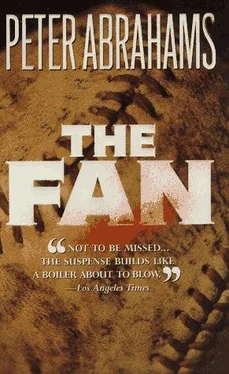Peter Abrahams - The Fan
Здесь есть возможность читать онлайн «Peter Abrahams - The Fan» весь текст электронной книги совершенно бесплатно (целиком полную версию без сокращений). В некоторых случаях можно слушать аудио, скачать через торрент в формате fb2 и присутствует краткое содержание. Жанр: Триллер, на английском языке. Описание произведения, (предисловие) а так же отзывы посетителей доступны на портале библиотеки ЛибКат.
- Название:The Fan
- Автор:
- Жанр:
- Год:неизвестен
- ISBN:нет данных
- Рейтинг книги:4 / 5. Голосов: 1
-
Избранное:Добавить в избранное
- Отзывы:
-
Ваша оценка:
- 80
- 1
- 2
- 3
- 4
- 5
The Fan: краткое содержание, описание и аннотация
Предлагаем к чтению аннотацию, описание, краткое содержание или предисловие (зависит от того, что написал сам автор книги «The Fan»). Если вы не нашли необходимую информацию о книге — напишите в комментариях, мы постараемся отыскать её.
The Fan — читать онлайн бесплатно полную книгу (весь текст) целиком
Ниже представлен текст книги, разбитый по страницам. Система сохранения места последней прочитанной страницы, позволяет с удобством читать онлайн бесплатно книгу «The Fan», без необходимости каждый раз заново искать на чём Вы остановились. Поставьте закладку, и сможете в любой момент перейти на страницу, на которой закончили чтение.
Интервал:
Закладка:
Only he knew.
Ninety. He eased off.
Only he knew. Gil had a thought, so powerful, so exciting that he broke into a sweat. It dampened his shirt, trickled down the undersides of his arms, moistened the leather-covered steering wheel beneath the palms of his hands. He was in a position, a unique position, to help the team. To actually help the team: to help them win games, to turn the season around, go all the way: almost like a real player. They needed him. Gil began to shake. He shook; it was no figure of speech. He had never before physically felt the force of an idea, felt it taking hold of his body like this. In his mind, a short and logical chain of events uncoiled into the near future.
On the South Shore, a block or two from the school where the Little League tryouts had been held, Gil found the ball field. A low chain-link fence ran parallel to the street, down the right-field line. He parked, got out, leaned on the fence rail.
An orange-shirted team was playing a green-shirted team, orange shirts at bat. Gil checked the electric scoreboard in center field: HOME 15, VISITORS 17, bottom of the fifth. Three and one on the batter, two outs. Gil looked down toward the infield, not far away. Runners on first and third, one of them with a long ponytail dangling from under an oversized batting helmet. A girl, he realized, but not immediately.
The pitcher wound up, threw. The ball arced slowly toward the plate. The batter, a fat boy with a stiff-legged stance, swung at it, even more slowly. He wasn’t even looking at the ball but hit it anyway, or it hit the bat, making a dull metallic twang: a soft fly to right.
Directly to the right fielder, standing about ten yards from Gil. He didn’t have to move a step. But for some reason he did move, in fact charged in wildly, as though the ball were going to fall in front of him and a diving catch was called for. At the last second he recognized his mistake and leaped, stabbing his gloved hand as high as he could. He missed the ball by an inch or so; it went over his head, landed behind him, bounced a few times, and rolled the rest of the way to the outfield fence.
The right fielder made a little moaning sound and chased after it. He picked it up at the base of the wall, turned, and threw. The shortstop, a tiny kid who ran well, knew enough to come out to take the cutoff, waving his sticklike arms. But the right fielder’s throw, a feeble, sidearmed effort, went nowhere near him. All the runners, even the fat boy, scored. HOME 18, VISITORS 17. The orange players jumped up and down.
The green center fielder, who hadn’t backed up the play, hadn’t even budged the whole time, glared through his thick glasses at the right fielder. “You geek, Richie,” he yelled. “You just lost us the game.”
The right fielder hung his head.
Richie.
The first thing Gil wanted to do was hop over the fence and smack the center fielder’s face. The second was smack Richie’s.
Gil did neither. He stood by the chain-link fence, gazing at Richie, thinking of what he should say.
“That’s okay, Richie, everybody boots one from time to time.” But boot them like that? And then throw like that?
Or: “Get your head up-they’re still playing.”
Or: “Don’t snivel, you little bastard.”
Before he could say anything, the next batter hit a little pop-up that the pitcher-another girl, Gil saw-caught easily, and the inning was over. The green team ran in. Furiously wiping his eyes with the back of his hand, Richie ran in too.
Gil hopped the fence. In foul ground, he walked toward the infield. The grass was soft and springy under his feet. Memories that he didn’t have time for arose instantly in the back of his mind, waiting for his attention. The orange team took the field, began throwing balls around. If only one got loose and rolled to him, he’d show them what throwing was about. He pictured himself flinging a bullet over the center-field fence, over the church across the street, over the trees behind it, gone. But no balls got loose and rolled to him.
There was a small set of bleachers along each baseline; three or four rows of benches, perhaps a dozen spectators in all. Gil sat in the bottom row on the first-base side, as close to the plate as he could get.
The umpire was a white-haired man who might have played third base long ago: bandy legs, Popeye forearms, leather skin. “Top of the sixth,” he said, pulling on his mask. “Last ups.”
The pitcher led off for the green team. She had a relaxed stance and a smooth, compact swing. She lined the first pitch up the middle for a clean single, and took second when the center fielder hesitated, sliding in under the throw. A man on the bench above Gil’s said, “All right, Crystal.”
“Ain’t over yet,” said another man. “Anything can happen, especially in the minors.”
“We just moved here,” said the first man. “Too late for the draft. Or Crystal would have been in the majors.”
The second man said nothing.
The first man spoke again: “According to that Pellegrini guy.”
The second man said nothing.
“He was real upset about it,” the first man said. “Called me personally.”
The second man remained silent. The first man gave up.
The next batter was the tiny shortstop. He walked on four pitches.
Gil turned to the second man. “Where are we in the order?”
The first man answered for him. “My daughter Crystal bats cleanup.”
The number-six hitter nubbed one down to first. The first baseman picked it up and stepped on the bag. The tiny kid and Crystal scooted over to second and third. One out, tying and go-ahead runners in scoring position.
The number-seven hitter surprised everyone by laying a bunt down the first-baseline. But as he ran out of the box, the ball bounced up and hit him in the thigh. The umpire called him out.
“What the hell is that?” said Crystal’s father.
“The rule,” replied Gil without turning.
Two out. The number-eight hitter stepped up-the center fielder with the thick glasses-and Richie came out of the third-base dugout and into the on-deck circle. At almost the same moment, the gate in the fence on that side opened, and Ellen and Tim walked in.
The first pitch was on its way. “Come on, Brendan,” called the second man. Brendan took a cut, but after the ball was already in the catcher’s mitt.
“Jesus,” said Crystal’s father, not quite under his breath.
“Come on, Brendan,” called Brendan’s father, louder this time.
Brendan watched the second pitch all the way, bat at rest on his shoulder.
“Strike two,” said the ump.
“Game over,” said Crystal’s father, making even less attempt this time to keep his voice down.
On the other side, Ellen had caught Richie’s eye and was waving to him, a big smile on her face. Richie didn’t wave back. Good boy, Gil thought. At that moment she saw Gil. Her eyes widened. She turned quickly to Tim.
The pitcher wound up, lobbed it in. Very slow, a little inside. Again, Brendan didn’t move. The ball glanced off his forearm. He screamed and fell down, writhing. After five or ten seconds, he realized he wasn’t hurt and took his free pass to first.
Two outs, bases loaded, game on the line. Richie stepped in.
Gil was on his feet now, but silent. Behind him Crystal’s father said, “Maybe he’ll get hit too. It’s our only chance.”
Richie took a few practice cuts. Horrible ones. Gil heard Ellen calling, “You can do it, Richie.” Gil shot a glance at the third-base side. Tim had disappeared.
The first pitch: a meatball, right down the middle. For a moment, Gil thought that Richie was going to let it go by; nothing wrong with that, taking the first pitch in a situation like this. But at the last moment, Richie swung, and missed by a foot.
Читать дальшеИнтервал:
Закладка:
Похожие книги на «The Fan»
Представляем Вашему вниманию похожие книги на «The Fan» списком для выбора. Мы отобрали схожую по названию и смыслу литературу в надежде предоставить читателям больше вариантов отыскать новые, интересные, ещё непрочитанные произведения.
Обсуждение, отзывы о книге «The Fan» и просто собственные мнения читателей. Оставьте ваши комментарии, напишите, что Вы думаете о произведении, его смысле или главных героях. Укажите что конкретно понравилось, а что нет, и почему Вы так считаете.












